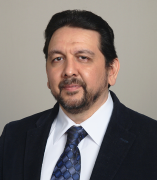
Aria Razfar, PhD
Professor
Curriculum & Instruction
Contact
Building & Room:
3428 ETMSW
Address:
1040 W. Harrison St. (MC 147), Chicago, IL 60607
Office Phone:
Email:
Related Sites:
About
Aria Razfar coordinates the Project ELMSA grant, preparing Chicago-area teachers to deliver culturally relevant instruction, while his personal research interests focus on the sociocultural dimensions of language and its meaning to human development.
Selected Publications
Razfar, A. & Rumenapp, J.C. (2013). Applying linguistics in the classroom: A sociocultural approach. NY, NY: Routledge Press.
Razfar, A. (2013). Multilingual mathematics: Learning through contested spaces of meaning making. International Multilingual Research Journal, 7 (3), 175-196.
Vomvoridi-Ivanović, E., & Razfar, A. (2013). In the shoes of English language learners: Helping educators understand some complexities of language in mathematics instructio through a baseball activity. Journal of Teaching for Excellence and Equity in Mathematics, 5 (1), 7-15.
Razfar, A. (2013). Dewey and Vygotsky: Incommensurability, intersections, and the empirical possibilities of metaphysical consciousness. Human Development, 56(2), 128-133.
Education
2003 - PhD, University of California, Los Angeles, Education
1997 - MS, University of Southern California, TESL
1995 - BA, University of California, Los Angeles, Linguistics & Philosophy
Professional Memberships
American Education Research Association, Annual Policy & Procedures Committee
American Association of Applied Linguistics
National Council of Teachers of Education
Research Currently in Progress
Razfar's research interests are grounded in sociocultural theories of language, learning, and human development. In particular, he draws on linguistic anthropological perspectives such as language socialization and language ideologies for the purposes of understanding learning and development in urban schools. He teaches courses in the Bilingual/ESL program as well as doctoral courses in Language, Literacy, and Culture. Dr. Razfar's work is anchored in communities whose language practices have been historically marginalized in many formal and official spaces of society; thus, there is an explicit social justice character to his research. He currently serves as a principal investigator or co-PI on several nationally funded grants aimed at improving teaching and learning for English Language Learners in urban contexts.